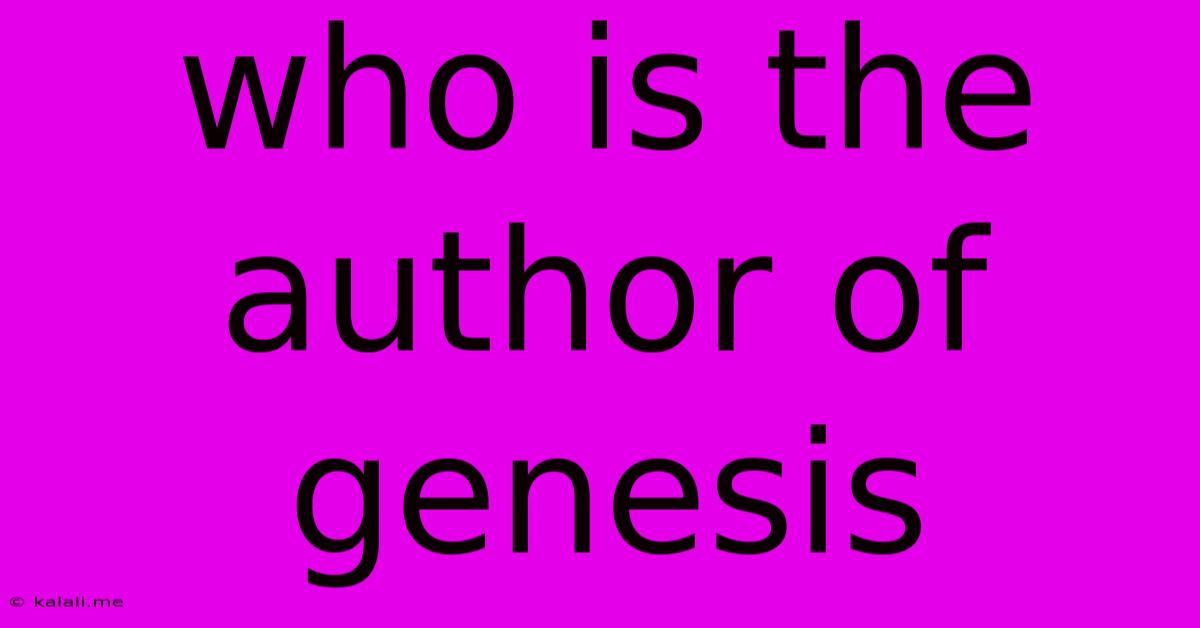Who Is The Author Of Genesis
Kalali
May 19, 2025 · 3 min read

Table of Contents
Who Wrote Genesis? Unraveling the Mystery Behind the Book of Beginnings
The authorship of Genesis, the first book of the Bible, is a question that has captivated scholars and theologians for centuries. Unlike some later biblical books that explicitly name their authors, Genesis remains shrouded in a degree of mystery. While we can't definitively point to a single person as the "author" in the modern sense, understanding the traditional attributions, the complexities of ancient authorship, and the diverse perspectives on its composition provides a richer appreciation of this foundational text.
This article will delve into the traditional authorship attributed to Moses, explore the documentary hypothesis, and examine other perspectives on the origins and compilation of Genesis. By the end, you'll have a clearer understanding of the complexities surrounding the question of who wrote Genesis.
The Traditional Attribution: Moses
For centuries, the prevailing belief within Jewish and Christian traditions has been that Moses authored the Pentateuch (the first five books of the Bible), including Genesis. This attribution is rooted in several passages within the books themselves, and in later Jewish and Christian writings. The assertion that Moses penned these foundational texts holds immense weight in religious contexts. This view supports the authority and divine inspiration of the texts, connecting them directly to a pivotal figure in Jewish history.
However, this traditional view faces significant challenges from a historical-critical perspective.
The Documentary Hypothesis: A Multi-Authored Genesis?
The Documentary Hypothesis, a widely accepted theory among biblical scholars, proposes that Genesis is not the work of a single author but rather a compilation of four distinct sources, often labeled J, E, P, and D. These sources are believed to have been written at different times and with varying theological perspectives:
- J (Yahwist): Characterized by its anthropomorphic depiction of God and use of the name "Yahweh" for God.
- E (Elohist): Employs the name "Elohim" for God and focuses on northern Israelite traditions.
- P (Priestly): Emphasizes priestly concerns, genealogical details, and ritual law.
- D (Deuteronomistic): Found primarily in Deuteronomy but influencing other parts of the Pentateuch, focusing on legal and ethical matters.
The Documentary Hypothesis suggests that these separate sources were later combined and edited to create the book of Genesis we have today. This explains the apparent inconsistencies and repetitions found within the text. Understanding Genesis through this lens shifts the focus from a single author to a complex process of redaction and compilation over time. This view allows for a deeper understanding of the diverse perspectives and historical contexts reflected in the text.
Beyond the Documentary Hypothesis: Other Perspectives
While the Documentary Hypothesis is a prevalent theory, it’s not universally accepted. Other scholarly approaches exist, proposing alternative models for the composition of Genesis. Some scholars suggest a more gradual process of accretion, with layers of tradition accumulating over time, rather than distinct, independent sources. These different interpretations highlight the ongoing scholarly debate and the inherent challenges in definitively determining the authorship of ancient texts.
Regardless of which perspective you find most convincing, the question of authorship remains a crucial element in interpreting the book of Genesis.
Conclusion: The Ongoing Debate
The question, "Who wrote Genesis?" doesn't have a simple answer. While the traditional attribution to Moses holds significant religious importance, the Documentary Hypothesis and other scholarly perspectives offer compelling alternative explanations for the book's composition. Ultimately, understanding the complexities surrounding Genesis's authorship allows for a richer, more nuanced reading of this foundational text and its profound impact on religious thought and history. The diverse scholarly viewpoints highlight the ongoing nature of biblical scholarship and the enduring power of Genesis to stimulate intellectual curiosity and theological reflection.
Latest Posts
Latest Posts
-
Integration Of X 1 X 2 1 2
May 19, 2025
-
Two Stroke Four Stroke Engine Difference
May 19, 2025
-
Difference Between 2 Stroke Engine And 4 Stroke
May 19, 2025
-
How Long Does It Take For A Wheel Alignment
May 19, 2025
-
How Old Was Mary When Jesus Born
May 19, 2025
Related Post
Thank you for visiting our website which covers about Who Is The Author Of Genesis . We hope the information provided has been useful to you. Feel free to contact us if you have any questions or need further assistance. See you next time and don't miss to bookmark.